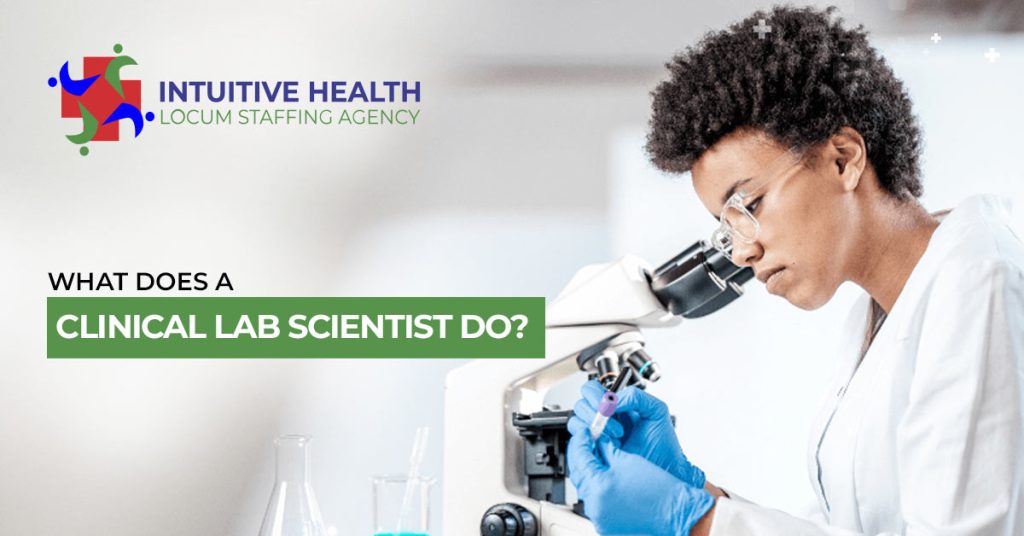Clinical Lab Scientist (CLS) play a key role in healthcare. They work behind the scenes, but their work impacts every patient. Doctors rely on their results to make treatment decisions. Fast and accurate testing helps save lives.
A CLS, also known as a Medical Laboratory Scientist (MLS) or Medical Technologist (MT), performs complex laboratory tests. They check blood, tissue, and other body fluids. They find infections, measure chemicals, and detect disease markers.

In today’s hospitals and labs, testing demand is growing. The need for skilled lab scientists is high. Staffing gaps often lead to more work for each scientist. Locum tenens roles — temporary or contract positions — help fill these gaps.
This blog explains what a CLS does, where they work, and how they train. You will learn about their duties, skills, and impact on patient care. We will also cover job outlook, salary data, and future trends in lab medicine.
Who Is a Clinical Laboratory Scientist?
A Clinical Laboratory Scientist (CLS) is a healthcare professional trained to run and interpret laboratory tests. In the United States, the title may vary. Many hospitals use Medical Laboratory Scientists (MLS). Some states still use the title “Medical Technologist” (MT).
CLS professionals study blood, urine, and tissue samples. They find signs of infection, measure hormones, and detect cancer markers. Their work gives doctors critical data for diagnosis and treatment.
Unlike Medical Laboratory Technicians (MLT), who perform routine tests, CLSs have more training. They hold a bachelor’s degree in medical laboratory science or a related field. They also complete a clinical practicum and pass a national certification exam.
Every Clinical Laboratory Scientist adheres to strict quality and safety standards. Their work must meet standards set by CLIA (Clinical Laboratory Improvement Amendments). These rules protect patient safety and ensure the accuracy of tests.
Core Duties and Daily Responsibilities of a Clinical Laboratory Scientist
A Clinical Laboratory Scientist has many tasks each day. Their main goal is to deliver accurate test results. These results guide doctors and nurses in treating patients, and if you’re looking to hire or place a CLS, this resource can help connect you with qualified professionals.
Specimen Processing
Work begins with patient samples. CLS professionals receive blood, urine, tissue, or other specimens for analysis. They check labels, log data into the Laboratory Information System (LIS), and prepare samples for testing. This step is critical because errors here can lead to wrong results.
Running Laboratory Tests
Medical Lab Scientists operate complex instruments and performs manual tests. They handle clinical chemistry, hematology, immunology, microbiology, and molecular diagnostics. For example, they measure blood glucose, identify bacteria, match blood for transfusions, or run PCR tests for viruses. For a closer look at another diagnostic role, you can read our guide on What Does the Phlebotomist Do? — since phlebotomists collect the blood samples that CLS later analyzes.
Analyzing and Interpreting Results
Once tests are complete, the CLS reviews data. They compare findings to reference ranges and flag abnormal results. If something looks wrong, they repeat the test or investigate possible issues.
Quality Control and Assurance
CLS runs quality control samples each day. They calibrate instruments and check reagents. They follow strict procedures to meet CLIA and CAP (College of American Pathologists) standards. This ensures results are valid and reproducible.
Maintaining Lab Equipment
Modern labs depend on automated analyzers. CLS clean, calibrate, and fix equipment when needed. Good maintenance keeps tests running smoothly and prevents mistakes.
Regulatory Compliance and Safety
A Clinical Lab Scientist follows biosafety rules to protect staff and patients. They use protective equipment, handle specimens carefully, and dispose of waste properly. They document work for audits and inspections.
Communication and Collaboration
After verifying results, CLS releases reports to physicians. They may call urgent results to the care team. Clear communication helps doctors treat patients faster.
Every step in this process affects patient care. Timely, accurate lab data can mean early diagnosis, proper medication, and better outcomes.
Education, Certification, and Licensure Requirements
Becoming a Clinical Laboratory Scientist (CLS) takes structured and focused training. It is not a short process. A CLS must meet strict education standards and gain hands-on practice before they can work independently. This pathway ensures accuracy and patient safety.
Education Requirements for Clinical Lab Scientists
Most CLS professionals earn a bachelor’s degree in Clinical Laboratory Science, Medical Laboratory Science, or biology or chemistry. The degree must be from a (NAACLS) – accredited program, which is the National Accrediting Agency for Clinical Laboratory Sciences. Accredited programs guarantee that students meet national standards for laboratory practice.
Coursework includes:
- Human biology and physiology
- General and organic chemistry
- Microbiology and immunology
- Hematology and coagulation
- Clinical chemistry
- Molecular diagnostics
- Laboratory management and safety
Students also learn statistics, quality control, and ethical practice. These topics prepare them to evaluate data and maintain compliance with regulations. In many labs, Clinical Laboratory Scientists work closely with Clinical Lab Assistants, who help process samples and manage workflow during testing. Understanding this team dynamic is important when training to become a CLS.
Suggested Read: What Is the Role of a Clinical Lab Assistant?
Clinical Practicum and Hands-On Training
After classroom study, students complete a clinical practicum in a hospital or diagnostic laboratory. During this phase, they rotate through different lab departments. They practice specimen handling, running tests, troubleshooting machines, and reporting results.
Supervised clinical training helps students gain confidence and accuracy. It also exposes them to the fast pace and teamwork needed in real labs.
Certification: National Exams
Most U.S. employers require certification. The most widely recognized is the American Society for Clinical Pathology (ASCP) Board of Certification exam. Other options include the American Medical Technologists (AMT) certification and the American Association of Bioanalysts (AAB) board exam.
Passing a national exam proves that the CLS meets national standards for competency. Continuing education is also required every few years for scientists who are certified in order to remain active.
State Licensure: Location-Specific Rules
Several states require a separate license to practice, including California, Florida, New York, Hawaii, and North Dakota. State licensure usually requires proof of education, proof of national certification, and sometimes a state-specific exam.
According to the reports by the American Society for Clinical Pathology (ASCP), state licensure makes sure lab professionals have the right education, hands-on training, pass required exams, and stay updated through continuing education.
Checking state rules before applying for jobs is critical. Meeting these education, certification, and licensure requirements ensures that every CLS is qualified to provide safe, reliable, and accurate laboratory results.
Work Settings and Environments for Clinical Laboratory Scientists
Clinical Laboratory Scientists (CLS) work in many different environments. Each setting has its own pace, technology, and challenges. Understanding these options helps new graduates and experienced professionals choose the right fit.
Hospital Laboratory Work
Most Clinical Laboratory Scientists Experts work in hospital labs. They handle a high volume of urgent tests, often 24/7. These labs support emergency rooms, operating rooms, and inpatient units. Work can be fast-paced and requires quick turnaround times for critical results.
Reference and Diagnostic Laboratories
Large diagnostic companies run central laboratories that serve many clinics and hospitals. CLS in these settings may process hundreds of samples per day. They often focus on efficiency and consistency. Automation is common in these facilities.
Public Health Lab Roles
State and local health departments employ CLS to track disease outbreaks. They test for foodborne illness, water contamination, and infectious diseases such as influenza or COVID-19. This work protects entire communities. CLS in these labs often rely on advanced technology and automated systems to manage high testing volumes efficiently — you can learn more about these innovations in our guide on How Technology is Shaping Health Department Jobs.
Blood Banks and Transfusion Services
Some CLSs specialize in immunohematology. They crossmatch donor blood, test for antibodies, and support transfusion medicine. Accuracy is critical to patient safety.
Research and Academic Laboratories
Some CLS professionals choose careers in research, where they help create new lab tests and work alongside scientists on clinical trials and medical breakthroughs.
Pharmaceutical and Biotech Industry
CLS professionals may work in drug development, manufacturing, or quality control. These roles require strict compliance with Food and Drug Administration (FDA) regulations.
Travel, Contract, and Locum Tenens Roles
Many Clinical Laboratory Scientists choose flexible work arrangements. Through locum tenens or travel contracts, they provide coverage in busy hospitals and labs. These locum tenens assignments may last weeks or months. They help keep patient care running smoothly during staffing gaps. To learn more about the benefits and structure of these temporary positions, check out our guide on Why Choose Locum Tenens?
Each work environment offers different opportunities for growth, specialization, and professional satisfaction.
Specializations and Advanced Roles for Clinical Laboratory Scientists
Clinical Laboratory Scientists (CLS) can focus on one area of laboratory medicine or remain generalists. Specialization helps them develop better expertise and often leads to career advancement.
Clinical Chemistry
This area focuses on testing blood and other fluids for chemicals such as glucose, cholesterol, enzymes, and hormones. CLS in this area support diagnosis of diabetes, liver disease, and endocrine disorders.
Hematology and Coagulation
Hematology specialists study blood cells. They help detect anemia, leukemia, clotting disorders, and infections. Coagulation testing guides safe surgery and treatment for bleeding disorders.
Microbiology and Virology
In this specialty, Clinical Laboratory Scientists detect viruses, fungi, parasites, and bacteria. They use culture methods, molecular tests, and antibiotic sensitivity studies. Their work supports infection control and outbreak management.
Immunology and Serology
Clinical Laboratory Scientists in immunology focus on immune function. They run tests that detect immune disorders, screen for allergies, and identify viral or bacterial infections.
Transfusion Medicine / Blood Bank
This specialty ensures safe blood transfusions. CLS match blood types, screen for antibodies, and release compatible blood products for surgery or trauma care. Accurate testing is critical to prevent transfusion-related infections, a process closely tied to monitoring infectious diseases and public health — see more in our guide on What Does a Podiatrist Do? for an example of how infection monitoring intersects with healthcare specialties.
Molecular Diagnostics and Genetics
This growing field uses polymerase chain reaction (PCR) and sequencing to detect genetic mutations, cancers, and infectious diseases at the molecular level.
Advanced Roles
Experienced CLSs may move into leadership as laboratory supervisors, managers, or quality coordinators. Others teach in CLS training programs or work in research and development. Some earn a master’s degree or a Doctorate in Clinical Laboratory Science (DCLS) to expand their scope and consult directly with physicians.
Specialization or advanced roles allow CLS professionals to grow in responsibility and influence while staying connected to patient care.
6 Major Skills and Competencies for Clinical Laboratory Scientists
Being a Clinical Laboratory Scientist (CLS) takes more than just operating lab equipment. It requires focus, attention to detail, and teamwork. Their work also demands communication, and strong problem-solving skills. The combination of these abilities ensures safe, accurate patient results.
- Technical Skills
A CLS must operate automated analyzers, microscopes, and molecular instruments with confidence. They run tests, maintain equipment, and follow standard operating procedures. They also handle reagents, prepare slides, and perform manual testing when required. For insights into the critical skills and protocols required in other healthcare roles, see What are the Key Skills and Requirements of a Registered Dietitian Job?
- Analytical and Critical Thinking
Laboratory results are only helpful if they are correct. CLS professionals must recognize abnormal data, troubleshoot errors, and decide when to repeat tests. They interpret complex findings and communicate them clearly.
- Regulatory and Quality Knowledge
CLS follows strict guidelines from the Occupational Safety and Health Administration (OSHA), the Clinical Laboratory Improvement Amendments (CLIA) and the College of American Pathologists (CAP). They document every step for audits and inspections.
- Detailed Orientation
Clinical Laboratory Scientists rely on precision at in every phase of life. They match patient identifiers, inspect specimens, and verify results to avoid errors that could affect care.
- Communication and Teamwork
CLS collaborates with nurses, physicians, and pharmacists. They may call critical results directly to a care team. Clear reporting speeds up patient care and treatment choices.
- Adaptability and Learning
Technology evolves quickly in laboratory medicine. CLS professionals must stay current with new instruments, molecular techniques, and automation tools through continuing education.
Developing these skills helps CLS maintain accuracy, safety, and trust in the healthcare system.
Role of Clinical Laboratory Scientists in the Healthcare Team
Clinical Laboratory Scientists (CLS) play a central role in patient care. Most medical decisions depend on lab results. Doctors and nurses rely on CLS data to diagnose disease, plan treatment, and monitor recovery.
Supporting Diagnosis
A CLS helps detect infections, cancers, and chronic conditions. They provide results that confirm or rule out possible causes of a patient’s symptoms.
Guiding Treatment
Laboratory data help select the right medication, dose, and therapy. For example, antibiotic sensitivity testing guides doctors in choosing the best drug for an infection.
Monitoring Progress
CLS professionals track whether treatments work. They measure changes in blood counts, hormone levels, and organ function over time.
Public Health and Safety
CLS work helps identify outbreaks and report notifiable diseases to public health agencies. In this way, illness can be prevented from spreading throughout the community.
By working closely with the healthcare team, CLS professionals ensure that every decision is supported by accurate, timely data.
Job Outlook, Demand, and Salary for Clinical Laboratory Scientists
The demand for Clinical Laboratory Scientists (CLS) in the United States remains steady. According to the study in the U.S. Bureau of Labor Statistics, clinical laboratory technologists and technicians will see employment growth of about 5 percent from 2023 to 2033, which is slightly faster than the average for all occupations.
High Demand and Staffing Needs
Many laboratories across hospitals, diagnostic centers, and public health agencies report staffing shortages. As lab test volumes rise, the need for skilled CLS professionals increases. This demand tends to be higher in rural and underserved regions.
Salary Ranges and Pay Influences
CLS compensation depends on many factors: location, shift schedule, specialization, facility type, and experience. Roles in hospitals, night shift work, or supervisory positions usually yield higher pay.
Locum Tenens and Contract Roles for CLSs
When full-time Clinical Laboratory Scientists are unavailable, temporary staffing helps maintain lab operations. Locum tenens and short-term contracts allow these experts to work on flexible schedules while keeping patient testing on track. Many of these roles are coordinated through healthcare staffing agencies, which manage pay, benefits, and assignments — learn more about how staffing agencies handle compensation in our guide on Do Staffing Agencies Pay You?
Overall, CLS professionals enjoy solid job security, diverse work options, and a positive outlook as demands for laboratory testing and diagnostics grow.
Challenges Faced by Clinical Laboratory Scientists
Clinical Laboratory Scientists (CLS) face several daily challenges. High testing volumes and staff shortages can create heavy workloads and stress. Many labs run 24 hours a day, so night, weekend, and holiday shifts are common.
Strict regulations from the Clinical Laboratory Improvement Amendments (CLIA) and other agencies require constant documentation and quality checks. Meeting these standards takes time and focus.
CLS professionals also need to stay current with rapid changes in technology, automation, and molecular testing. Continuous education is necessary but can add extra pressure. Despite these challenges, most CLS professionals find the work rewarding because it directly impacts patient care and public health. Many CLS professionals rely on specialized healthcare staffing services to find flexible, locum tenens, or contract positions that match their future career goals.
Key Takeaways for Future Clinical Laboratory Scientists
Clinical Laboratory Scientists (CLS) are essential members of the healthcare team. Their work supports nearly every diagnosis and treatment decision. They handle patient specimens, run complex tests, and ensure results are correct and timely.
Becoming a CLS requires formal education, supervised clinical training, national certification through the American Society for Clinical Pathology (ASCP), American Medical Technologists (AMT), or American Association of Bioanalysts (AAB), and in some states, a license to practice.
As testing demand continues to rise, CLS professionals remain in high demand across hospitals, reference labs, and public health systems. Specializations, leadership roles, and locum tenens assignments offer even more career flexibility.
For those considering a healthcare career, clinical laboratory science provides meaningful work that directly impacts patient outcomes and community health. If you have questions or want to explore career opportunities, please Contact Us to speak with our team.

